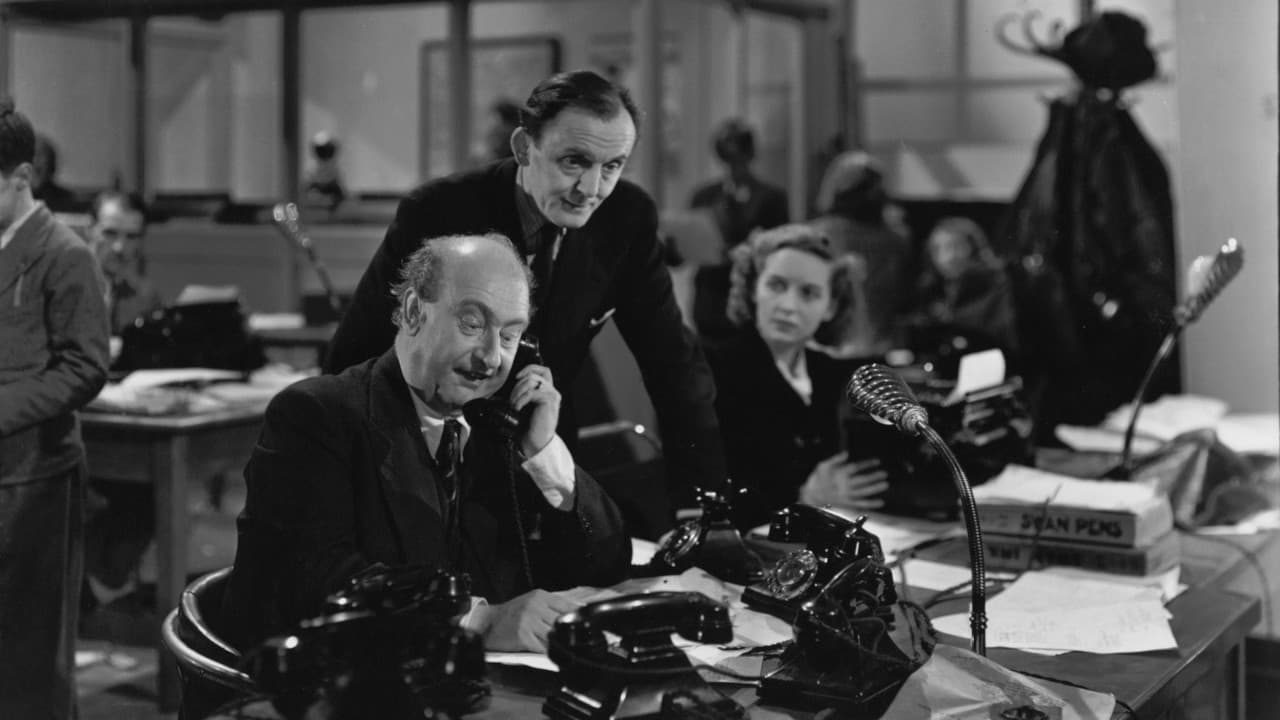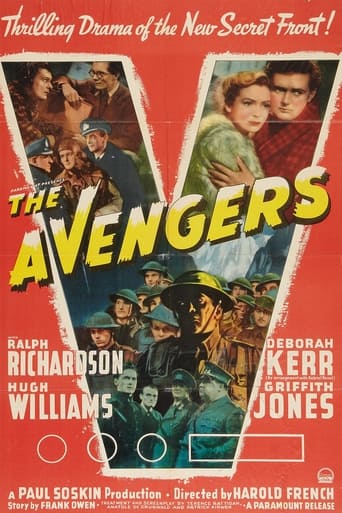

ridiculous rating
... View MoreA very feeble attempt at affirmatie action
... View MoreGo in cold, and you're likely to emerge with your blood boiling. This has to be seen to be believed.
... View MoreIt really made me laugh, but for some moments I was tearing up because I could relate so much.
... View MoreWe have seen this before, the freedom fighters of Norway under Nazi occupation, their hardship, their courage, their determination, their heroism and so on, and if this film at least is better than "The Moon Is Down" on the same theme, it's not up to Errol Flynn's "The Edge of Darkness". The one outstanding asset of this film though is the leading lady, a very young Deborah Kerr, who in a way sustains the whole movie. In the beginning she is just a very cheerful and happy Norwegian lass, but when the Germans come to build an oil refinery, which turns out to be a submarine base, the Norwegians get into trouble, and in order to save her father's life (Finlay Currie) Deborah has to marry the local Quisling, the local police, whom the Norwegians don't know at first that he is collaborating with the Germans (Francis L. Sullivan, awesome as usual.) When Hugh Williams as an English spy learns this on his second coming, he fell in love with Deborah during the first, he is not very happy.It's a very typical British edifying war film from the very darkest year 1942 and sides with many others of the same kind, outdated today, but still interesting for their great moral enthusiasm about surviving and fighting tyranny.
... View MoreThe first five minutes of this film - set in a national newspaper office as Germany invades Poland - are superb. Unfortunately the rest of the film suffers in comparison and the most interesting character, played by a relatively young and buzzing Ralph Richardson, is killed off far too early. Otherwise it could have rivalled Q-Planes, another Richardson tour de force from a couple of years earlier. Williams is effective but slightly colourless in the lead although Deborah Kerr sparkles. The Rule Britannia v Horst Wessel scene in the bar echoes the more celebrated La Marseillaise v Watch on the Rhine song battle in Casablanca. I wonder which came first?
... View MoreA typical propaganda film of the period, containing comical German stereotypes, a bland predictable plot, and of course, an American hero, in an effort to create a sense of fraternity. It's simply not credible - British audiences must have been really gullible to put up with this.It does however manage to collect a couple of honours as far as I'm concerned -it has the worst fight scene I've ever seen - it's worth watching the first 5 minutes just to see it !it has the worst bit of set design I've ever seen - in the last 5 minutes when the heroic British invasion forces land (just in time to prevent the execution of the hero.....), the landing craft, which people on the beach pull in with a rope, appears to have been knocked up by a carpenter using banisters for the side and a bit of chipboard for the ramp. It looks like something children would construct for the school play !
... View MorePossible spoilersThe technical limitations of the cinema in the early forties meant that it was not possible at that date to portray battle scenes with any degree of convincing realism; many of what we now remember as great Second World War films were made in the fifties and sixties, long after the war itself had finished. Nevertheless, film-makers in both Britain and America were keen to show their patriotism by making propaganda films in support of the war effort. A popular way of doing this was to concentrate on the struggles being waged by European resistance movements against Nazi occupation, as the small-scale guerrilla actions involved in these struggles were easier to show than full-scale battles. This led to British films such as 'The Foreman Went to France', 'One of our Aircraft is Missing' (set in Holland), and 'Went the Day Well', which features British resistance to a fictitious German invasion. There were also American equivalents, such as 'The Moon is Down', (set in Norway), 'The North Star' (set in the Ukraine) and, most famously, 'Casablanca', set in French Morocco. 'The Day Will Dawn' falls within this tradition. Colin Metcalfe, a young journalist, is parachuted into occupied Norway to help the Norwegian Resistance destroy a U-Boat base in a fiord. Metcalfe is familiar with the area, having previously been his newspaper's Norwegian correspondent, and volunteers for the mission partly out of patriotic zeal to 'do his bit' and partly in the hope of rekindling a romance with Kari, the beautiful daughter of a local fisherman. To his horror, however, he finds that Kari is now engaged to be married to Inspector Gunther, the unpleasant pro-Quisling chief of police for the district. The plot unfolds in the best 'Boy's Own' tradition, with Metcalfe and his heroic Norwegian allies battling the dastardly Nazis.'The North Star' is admittedly a ludicrous and distasteful attempt to whitewash Stalinism, but some of the above films- particularly 'Casablanca' but also, in my view, 'Went the Day Well?'- are today classics. 'The Day Will Dawn', however, does not fall into that category. No doubt it was well received in its day by audiences who enjoyed its celebration of British (and Norwegian) daring and determination and its message that the Nazis could be beaten, but it is today no more than a mediocre period piece. It was obviously shot quickly, and on a small budget. The acting is unmemorable; the best-known cast member is Deborah Kerr, as Kari, but this is one of her weaker films. In some of her other early films, such as 'Love on the Dole', she showed great promise, but she gives little hint here that she would go on to become a major Hollywood star. The main reason, however, why the film fails to convince today is that it seems too much like heavy-handed propaganda to be entertaining. Like a number of propagandist movies ('The Green Berets', set in Vietnam, is another example that comes to mind) it makes the mistake of going over the top. By this I do not mean that it exaggerates Nazi brutality, as the real Nazis were every bit as bad as those depicted in the film, and worse. I mean that the film never misses an opportunity to score propaganda points, even when this is to the detriment of the story. For example, almost as soon as Metcalfe lands, his life is saved when an anti-Nazi Austrian soldier not only allows him to escape, but even tells him how he can make contact with the resistance. The authors clearly wanted to imply that all Austrians were anti-German, ignoring the fact that many actually supported the Anschluss, and that even those who opposed it often did so because they were against Nazism, not against the principle of union with Germany. No doubt there were many Wehrmacht soldiers who disliked the regime for which they were fighting, but few if any of these would have risked execution for treason or dereliction of duty by deliberately failing to capture a British agent. The Resistance would certainly not have revealed their secrets to anyone in German uniform. Similarly, it seems unlikely that a Resistance fighter would have drawn attention to his pro-Allied sympathies by keeping a portrait of George Washington in his home, or that the general population would have given such open support to attacking British troops. To do so, given that the attack was merely a commando raid rather than final liberation, would have been to invite bloody retribution once German forces had re-established control of the area. The villains are not only wicked but also cowardly and physically unattractive; the senior German officer, for example, is so grotesquely fat that in real life he would doubtless have been rejected as unfit for military service. The treachery of the Quisling Gunther is explained by the fact that he is himself half-German, with the implication that no pure-blooded Norwegian would have betrayed his country. The occupying German troops all speak fluent Norwegian; this is explained by saying that, as children, they took refuge in Norway from the First World War. The idea, of course, is to try and add the sin of ingratitude to the other crimes of which the Nazis are guilty. Unfortunately, this supposed historical episode is completely fictitious. Watching 'The Day Will Dawn', it struck me that Dr Goebbels was not the only person in 1942 who was distorting the truth for political ends and that a film made in a good cause is not automatically a good film. 5/10
... View More